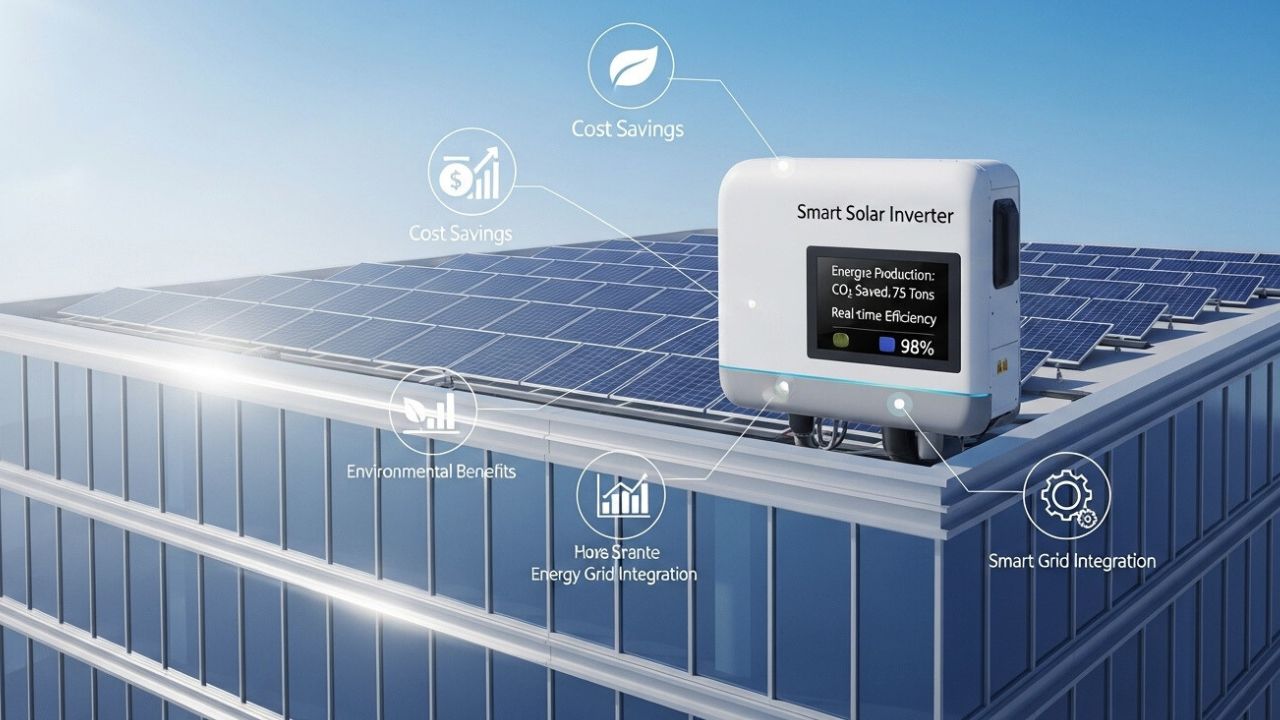Introduction
As India’s commercial sector increasingly embraces renewable energy, smart solar inverters are becoming indispensable components of efficient solar power systems. These next-generation inverters not only convert solar DC power into AC electricity but also provide advanced features like real-time monitoring, grid regulation, battery integration, and enhanced safety measures. For commercial buildings—including offices, malls, industrial parks, and data centers—smart solar inverters offer superior performance, cost savings, and operational reliability in 2025’s dynamic energy landscape.
This article explores the multifaceted benefits of smart solar inverters for commercial buildings in India, backed by the latest technological advancements and market trends. It also includes practical examples, FAQs, and guidance to help businesses optimise their solar investment.
Understanding Smart Solar Inverters
What is a Smart Solar Inverter?
A smart solar inverter is an advanced power electronics device that converts direct current (DC) generated by solar panels into alternating current (AC) used by commercial electrical systems. Unlike traditional inverters, smart inverters incorporate digital communication, artificial intelligence (AI), internet of things (IoT) connectivity, and energy management techniques to optimize performance and reliability.
Key Features:
- Maximum Power Point Tracking (MPPT) increases energy capture efficiency even in challenging weather or shading conditions.
- Real-time remote monitoring and diagnostics via mobile apps or cloud platforms enable proactive maintenance and system optimization.
- Grid support functions regulate voltage and frequency, enhancing stability and allowing smooth integration with power utilities.
- Compatibility with battery storage systems for hybrid operation and uninterrupted power supply during outages.
- Enhanced safety features like anti-islanding protection and fault detection ensure secure operation.
Read Also: Commercial Rooftop Solar System Payback in India 2025: A Complete Guide for Businesses
Benefits for Commercial Buildings
- Dramatic Energy Cost Savings
Smart solar inverters optimize every kilowatt-hour generated by rooftop or ground-mounted solar PV systems. With improved power conversion efficiencies above 98% and MPPT capabilities, commercial buildings reduce grid electricity consumption significantly. Studies show commercial users can cut electricity bills by 60-80%, maximizing return on solar investments. - Real-Time Monitoring & Remote Control
Operators can monitor system health, energy production, and consumption patterns from anywhere. This transparency enables rapid fault detection and remote troubleshooting, minimizing downtime and costly on-site service visits. For large commercial facilities, this means higher energy yield and lower operational expenses. - Grid Stability and Compliance
With India’s grid evolving to accommodate more renewable energy, smart inverters play a critical role in mitigating voltage fluctuations, frequency variations, and harmonics. Their autonomous grid support functions help commercial installations comply with regulatory requirements like voltage ride-through and frequency control, ensuring stable and safe energy flows. - Battery Integration & Energy Independence
Commercial buildings leveraging smart inverters can integrate battery storage to shift energy use from peak to off-peak hours, reducing demand charges and enhancing resilience during grid outages. This reduces dependency on unreliable utility power and supports sustainability goals through consistent clean energy use. - Enhanced Safety and Reliability
Features like anti-islanding protection prevent solar systems from feeding power back to the grid during outages, protecting utility workers and equipment. Smart diagnostics detect and isolate faults promptly, safeguarding commercial electrical infrastructure from damage and enhancing system longevity. - Environmental & Corporate Social Responsibility (CSR) Impact
By optimizing solar energy use, smart inverters help commercial entities reduce carbon footprints, qualifying them for green certifications and enhancing brand reputation among environmentally conscious customers and stakeholders.
Examples of Commercial Applications
- Office Buildings: Smart inverters enable offices to manage solar generation alongside HVAC, lighting, and IT loads, reducing utility costs and supporting sustainability pledges.
- Shopping Malls: Large solar arrays connected via smart inverters power retail spaces, escalators, and parking areas while providing real-time energy data for management.
- Industrial Parks: Energy-intensive operations in manufacturing benefit from smart inverter-enabled hybrid power solutions that maintain uptime and reduce grid dependency.
- Data Centers: Continuous power availability with battery integration ensures mission-critical IT infrastructure remains online with minimal carbon impact.
- Educational Campuses: Smart inverters facilitate solar-plus-storage systems, supporting uninterrupted learning environments and reducing energy expenses.
Choosing the Right Smart Solar Inverter
Factors to Consider:
- Efficiency Ratings: Look for inverters with ≥98% efficiency to maximize solar energy utilization.
- Power Capacity: Select inverters matching the scale of commercial solar installations (from kW to MW levels).
- Digital Compatibility: Ensure support for cloud-based monitoring platforms and IoT protocols.
- Warranty and Support: Choose brands offering extended warranties and local service networks.
- Compliance Certifications: Confirm adherence to Indian grid codes and IEC standards.
Top Brands in India include Sungrow, Microtek, Luminous, Growatt, and Waaree, known for reliability, smart features, and post-sales support.
FAQs
- How do smart solar inverters save money for commercial buildings?
They improve energy conversion efficiency, enable energy management with battery backups, reduce grid consumption, and minimize maintenance costs through remote monitoring. - Can smart inverters help during grid blackouts?
Yes, by integrating with battery storage systems, smart inverters provide uninterrupted power supply during outages, essential for mission-critical commercial operations. - Are smart solar inverters compliant with Indian grid regulations?
Top smart inverters meet Indian grid code requirements, including voltage and frequency regulation, anti-islanding protection, and fault ride-through capabilities. - What maintenance is required for smart inverters in commercial solar setups?
Regular software updates, monitoring system performance remotely, periodic cleaning, and inspection by trained technicians ensure optimal operation. - How do smart inverters integrate with energy storage?
They control charging/discharging cycles, optimize battery health, and balance solar energy flow to building loads and the grid efficiently.
Conclusion
Smart solar inverters are revolutionising the commercial solar landscape in India by enhancing efficiency, reliability, and grid integration. For commercial buildings aspiring to reduce energy costs, improve sustainability, and ensure operational continuity, these inverters are critical technological enablers. Investments in smart inverter systems empower businesses to harness solar power effectively, comply with evolving regulations, and contribute to a greener future. As Indian industries and commercial real estate increasingly adopt renewable energy, smart solar inverters will remain at the forefront, maximising solar potential and delivering superior value.





5 thoughts on “Smart Solar Inverter Benefits for Commercial Buildings in India 2025”